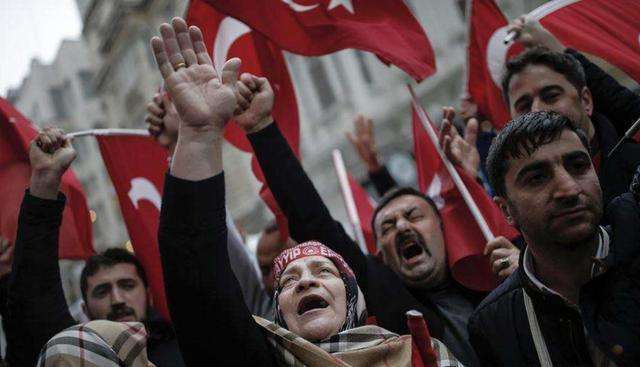
Thousands of protesters have filled the streets of Ankara, Turkey's capital, raising flags and chanting slogans demanding radical changes to the economy. At the heart of the protests are changes to the minimum wage and the government's responsibility for managing the economy. The government announced this week that the monthly net minimum wage for 2025 will be set at 22,104 Turkish lira ($630.28), an increase from the previous year, but the increase has failed to quell popular discontent. On the contrary, the protesters argue that the increase is far less than the increase in the real cost of living, especially in the current context of high inflation, the minimum wage increase is almost negligible.
From an economic perspective, the setting of minimum wages is a complex and sensitive issue. It is not only related to the basic life security of workers, but also directly affects the production cost of enterprises, the supply and demand balance of the job market and the operation of the overall economy. Although the minimum wage proposed by the Turkish government has increased numerically, the increase is so low that it clearly fails to fully take into account the actual situation of the current economic environment.
First, we need to look at the current level of inflation in Turkey. Annual inflation is expected to be 45 per cent this year, a staggering figure that means the purchasing power of money in people's hands is rapidly diminishing. In this context, even if the minimum wage increases, but if the increase is well below the rate of inflation, then the living standards of workers are actually falling. Of the 70 percent increase called for by Turkish workers, 45 percent is to offset the impact of inflation, while the remaining 20 percent is to improve the quality of life. However, the government's decision clearly fails to meet this legitimate demand.
Second, from the perspective of the job market, the setting of the minimum wage also needs to be carefully balanced. On the one hand, too low minimum wage may lead to difficulties in workers' lives and affect social stability; On the other hand, a high minimum wage may increase the production cost of enterprises, causing enterprises to lay off workers or reduce the scale of hiring, thus exacerbating the unemployment problem. The Turkish government's decision this time, while taking into account the stability of the job market to some extent, clearly failed to fully anticipate the protests and the risk of social unrest that could result.
In addition, it is important to note that the Turkish government's decision has also come under strong criticism from the opposition. The main opposition CHP accused the government of being "out of touch with Turkey's reality" and pointed to its weak handling of inflation and the minimum wage. CHP leader Orzel bluntly told the rally that the government's claim that "inflation will increase and the minimum wage will increase" is a "big lie." He stressed that if the government could not effectively tackle the inflation problem, raising the minimum wage would only be a palliative measure rather than a cure. This view is shared and supported by the majority of protesters.
The Turkish government's minimum wage decision also reflects its economic management dilemma. On the one hand, the government needs to maintain fiscal discipline and control the scale of deficit to prevent financial risks. On the other hand, the government needs to meet the basic needs of the people and maintain social stability. However, in the current economic climate, these two goals seem difficult to achieve simultaneously. The government has tried to placate the public by raising the minimum wage, but the increase is too low to appease them. This dilemma tests not only the wisdom and decision-making capacity of the government, but also the resilience and resilience of Turkish society.
It is important to note that Turkey's inflation problem will not be solved overnight. Turkey's economy has long been influenced by a combination of internal and external factors. On the domestic side, the unreasonable economic structure, low production efficiency and political instability and other factors have restricted the economic development; Internationally, disruptions in the global supply chain, geopolitical tensions and fluctuations in the US dollar exchange rate have also had a significant impact on the Turkish economy. In this context, the government needs to take more comprehensive and effective measures to deal with the inflation problem, rather than just relying on the temporary approach of raising the minimum wage.
In addition, the government also needs to strengthen communication and collaboration with various sectors of society. When formulating economic policies, we should fully listen to the opinions and suggestions of workers, enterprises and opposition parties to ensure the rationality and feasibility of policies. At the same time, the government should also strengthen the construction of information openness and transparency, so that the public can learn about the formulation and implementation of economic policies in a timely manner, so as to enhance the credibility of the government and the public's trust.
To sum up, the Turkish government's decision on the minimum wage has sparked widespread controversy and protests. From an economic point of view, there are indeed many problems and shortcomings in this decision. The government needs to deeply reflect on its own economic management strategy and policy making process, and actively seek effective ways and methods to solve the inflation problem, so as to ensure economic stability and social harmony. At the same time, the government also needs to strengthen communication and collaboration with all sectors of society to jointly promote the sustainable and healthy development of the Turkish economy. Only in this way can the social contradictions and discontent caused by the minimum wage issue be fundamentally resolved.

报告显示,中国电力投资加速增长,预计2024年电网基建投资将超过5300亿元。
近日,市场迎来了一则引人注目的消息:工业巨头3M公司(MMM.N)在本周五公布了其季度业绩报告,随后股价飙升至近两年来的
最近,外媒给OpenAI算了笔账,今年可能要血亏50亿美元。
近日,巴黎奥运会和世界铁人三项协会联合发布了一项重大决定,宣布因塞纳河水质污染问题,原定于近期进行的奥运会铁人三项首次下
当地时间7月18日,法国巴黎发生了一起令人震惊的持刀袭警事件。
近期,一则重大消息在国际舞台上引起轩然大波,马来西亚宣布加入金砖国家。
调查发现,互联网和智能手机的使用干扰了韩国近五分之一学生的生活。